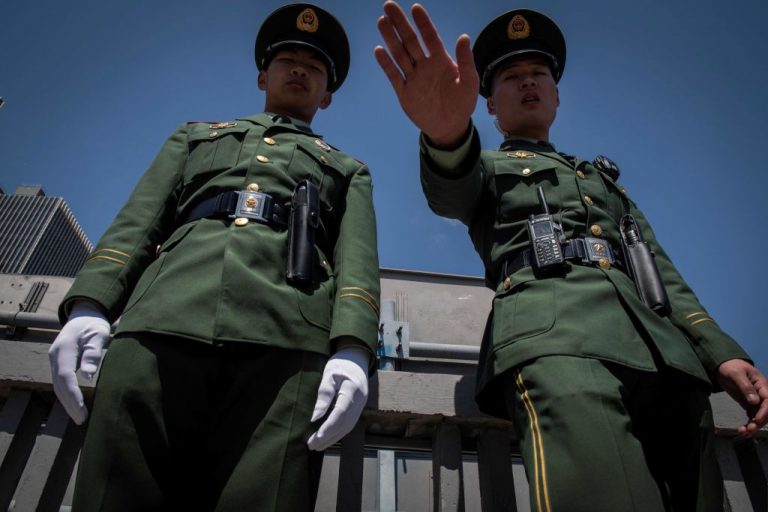The Chinese Communist Party’s (CCP) 20th Party Congress, slated to begin on Oct. 16, will take place over the course of a month, and is widely expected to see current leader Xi Jinping secure a precedent-breaking third term as China’s president and CCP general secretary.
Ahead of the important meeting — which takes place every five years — the Chinese regime has intensified its efforts to crack down on activists who speak out against the government or government-mandated policies.
All forms of “political dissent” deemed questionable by the authoritarian regime will be held under enhanced scrutiny — with authorities reserving the right to arrest and imprison anyone who violates this principle.
MORE ON CHINESE POLITICS:
- Xi Meets Putin, Other Leaders During First Trip Outside China in Over 2 Years
- China’s ‘Strategic Partnership’ With Russia Is a Growing Liability for Xi
- China Hands Suspended Death Sentences to Ex-Justice Minister Fu Zhenghua and Other ‘Political Liars’
- Xi’s Political Status Intact After Beidaihe, But Crises Deepen Ahead of Party Congress
Increased censorship
Recently, a Chinese film titled Return to Dust was removed from all streaming platforms in the country. The movie, which talks about the struggles of a poverty-stricken farming couple in rural China was taken down after officials said the movie “promoted an inaccurate portrayal of Chinese people,” U.S.-based outlet Radio Free Asia (RFA) reported.
After being taken down, droves of netizens took to social media to voice their frustrations over what they consider to be “extreme measures” by the government’s censorship programs.
Success
You are now signed up for our newsletter
Success
Check your email to complete sign up
One user said on China’s Twitter-like social media platform, Weibo, that the movie had been taken down and was “not available” on any streaming sites.
“Why was it taken down?” dozens of people were seen asking, with one user pointing out that the film’s “abrupt ending” where the couple is driven to commit suicide after being continuously shunned by their communities may have been a key reason for its removal.
“I am a native of the northwest,” Wang Ruiqin, a former member of the Chinese People’s Political Consultative Conference from the province of Qinghai told RFA.
“I spent a long time in Qinghai and Gansu, and I’m very familiar with those places,” Wang said, adding that, “This film paints a very vivid and realistic portrait of rural life in the northwest.”
Wang, who now lives in the U.S. with his family, said it is common for the CCP to view any storylines similar to that of “Return to Dust” as “an attack on the ruling Party.”
“The ideological trend in China right now is that everything is influenced by CCP control, and the CCP regards [this sort of story] as a kind of slander, and it won’t tolerate any kind of objective or accurate portrayals,” Wang said.
“They only want to hear praise [for the CCP], and will attack anything to do with social injustice as unacceptable.”
Doubling down on arrests
In another case that has sparked public outrage, a man named Dong Jianbiao from China’s southern province of Hunan was forcefully committed to a psychiatric facility for speaking out on behalf of his daughter Dong Yaoqiong.
In July 2018, Yaoqiong posted a live-stream of herself defacing a poster of Xi Jinping and splashing ink on it.
Shortly after the incident, police detained Yaoqiong and sent her to a mental institution. After her father spoke out against the arrest, authorities detained and committed him to a psychiatric facility as well.
On Sept. 26, RFA reported that the elder Dong had died while in detention at the undisclosed facility. According to the report, authorities were “moving to cremate his remains amid suspicions of foul play.”
Dong died on Sept. 23 while under custody, activist Chen Siming was quoted as saying.
RELATED:
- How Chinese Police Persecute Dissidents Under the Guise of ‘Good Health’: NGO Report
- Disappeared: The Faces of Human Rights Activists Silenced by Communist China
- Pregnant Chinese School Teacher Forced Into Psychiatric Hospital for Social Media Posts
- Media Tycoon Jimmy Lai to Plead Not Guilty Under Hong Kong National Security Law Despite Threat of Life Imprisonment
An August report by non-governmental human rights group Safeguard Defenders also shed new light on how Chinese authorities have resorted to routinely locking up activists and members of disenfranchised groups in psychiatric facilities as a way to silence them.
Titled “Drugged and Detained: China’s Psychiatric Prisons,” the report describes how the CCP has been employing this method of forcefully committing people into psychiatric wards without proper medical justification — tracing the practice back to the 1980s.
Since the regime took power in 1949, it has been common practice for CCP officers to arbitrarily arrest, imprison, and even torture activists and human rights attorneys for speaking out or trying to help disenfranchised group members, such as Uyghur Muslims and Falun Gong adherents.
Thousands of activists have since been arrested and charged under “crimes of subversion.” For many, their fates remain unknown.














